|
***Editor's Note: Next week, DPN will be released on Tuesday, June 1st due to the Memorial Day Holiday.***
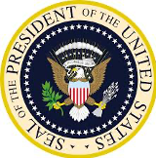 Biden-Harris Administration Biden-Harris Administration
 Credit for Caring Act Credit for Caring Act
U.S. Senators Joni Ernst (R-Iowa), Michael Bennet (D-Colo.), Shelley Moore Capito (R-W.Va.), Elizabeth Warren (D-Mass.), Representatives Sanchez (D-Cal) and Reed (R-NY) have introduced the Credit for Caring Act ( S.1670, H.R.3321) to provide for those who are taking on added financial responsibilities as family caregivers supporting a loved one. The nonrefundable tax credit of up to $5,000 could be used toward expenses such as transportation, home modifications to accommodate a family member, medication management services, and training or education for the caregiver.
Plain language:
- A bill to help with the cost of supporting a person with a disability has been introduced to Congress.
What this means to you:
- Under the bill, qualifying care recipients must have been certified by a health care practitioner to be in need of long-term care for at least 180 consecutive days. Eligibility is limited to a caregiver of a qualified care recipient who must pay for caregiving expenses and has earned income in excess of $7,500. Credit is phased out when income exceeds $150,000 for joint filers or $75,000 for individual filers.
Action steps:
- Learn more about the bill in the press release.
- Contact your Members of Congress and ask them to co-sponsor this bill, sharing why support for caregiving is important to you.
-
All Stations Accessibility Program (ASAP) Act
Senators Tammy Duckworth (D-IL), Sherrod Brown (D-OH), Bob Casey (D-PA), and Representatives Jesús "Chuy" García (D-IL-04) and Marie Newman (D-IL-03) introduced the All Stations Accessibility Program (ASAP) Act of 2021( S.1680, H.R.3317). This bill would help make public transportation systems more accessible to passengers with disabilities by providing funding to upgrade existing public transportation and commuter rail stations to meet or exceed accessibility standards under the Americans with Disabilities Act (ADA). Plain language:
- A bill to make all public transportation stations accessible has been introduced in Congress.
What it means to you:
- Public transportation systems should be accessible to all Americans, but over 30 years after the Americans with Disabilities Act, many are not. This bill ensures the federal government provides the resources local transit agencies need to make accessibility a reality. Getting support for this bill is a way to include this need in infrastructure investments.
Action steps:
- Learn about the bill.
- Share the opportunity to support the bill along with your experience with accessible transportation with both of your Senators and your Representative.
-
 Allied Health Workforce Diversity Act Allied Health Workforce Diversity Act
The Allied Health Workforce Diversity Act ( S.1679, H.R.3320) was introduced by Sen. Bob Casey (D-PA) and Sen. Lisa Murkowski (R-AK) in the Senate, and Rep. Bobby Rush (D-IL) and Rep. Markwayne Mullen (R-OK) in the House. This bill would increase opportunities for individuals underrepresented in the professions of physical therapy, occupational therapy, speech-language pathology, respiratory therapy, and audiology. The legislation would provide funding to accredited education programs for these professions toward using evidence-based strategies to increase the recruitment, enrollment, retention, and graduation of students who are currently underrepresented, such as racial and ethnic minority populations, individuals with disabilities, and those from economically disadvantaged backgrounds.
Plain language:
- A bill to try to make the workforce more diverse has been introduced.
What it means to you:
- Minorities and people with disabilities are significantly underrepresented in the health professional workforce. AUCD is among the national organizations supporting a bill that seeks to address this.
Action steps:
- Learn more about the bill in the American Physical Therapy Association's fact sheet.
- Contact your Members of Congress and ask them to co-sponsor this bill, sharing why diversity in the workforce is important to you.
 Recovery Proposals Recovery Proposals
The White House announced a $1.7 trillion counterproposal on Friday in pursuit of a bipartisan deal on infrastructure, reducing the price tag of President Biden's infrastructure proposal by $550 billion. Key changes include:
- Reduced funding for broadband expansion to $65 billion;
- Reduced investments in roads, bridges, and other major infrastructure projects from $159 billion to $120 billion;
- A decision to no longer include investments in research and development, supply chains, and manufacturing in the President's package proposals.
Congress continues work on legislative text to respond to the proposals. Priorities in the disability community that are being considered as part of the legislative packages include:
- Ending subminimum wages and modernizing disability employment supports to allow for competitive, integrated employment;
- Continued expansion of access to Home and Community-Based Services (HCBS) for people with disabilities, ending waiting lists for services and ensuring a stable, valued direct support workforce;
- Meeting the needs of children, including children with disabilities in childcare and education from birth through college; and
- Ensuring all modernization of physical and virtual infrastructures are accessible.
Plain language:
- Congress is working on a big bill that could help people with disabilities. You may be hearing about it as a plan for improving our country's infrastructure.
- Infrastructure means the buildings, roads, bridges, power lines, and other things our country needs to work every day. It can also include systems that make our country work, like schools, healthcare, and other government services.
What it means to you:
- Disability issues are a large part of the American Jobs Plan, creating a need for all members of Congress to hear from you about Home and Community-Based Services and Competitive Integrated Employment. It is very important that all members of Congress are hearing from their constituents about how these investments will impact people and systems in your community.
Action steps:
- Learn more about proposals:
- Read and consider signing onto the joint letter from Aging, Disability, and Workforce groups.
- Email or call the Capitol Switchboard at (202) 224-3121 (voice) or (202) 224-3091(tty) and ask to be connected to your Senators and Representatives.
- You can use Congress.gov to find your Members of Congress.
- Leave a brief message sharing that Home and Community-Based Services (HCBS) and Competitive Integrated Employment are important to you. Ask to be updated on how the Member will support these issues.
 COVID-19 Guidance COVID-19 Guidance
The CDC recommends continued mask-wearing in K-12 schools. Although the CDC has announced that vaccinated people no longer need to wear masks in most settings, the guidance continues to require mask use in classrooms through the end of the 2021 school year.
COVID-19 Hate Crimes Act
The House on May 18th passed legislation ( H.R.1843) aimed at combating a rise in hate crimes against Asian Americans during the coronavirus pandemic, in a 364-62 vote. The Senate had approved the legislation ( S.937) last month. President Biden signed the bill into law on May 20th.
Plain language:
- Racism hurts our country. Congress passed a bill to help stop the hate crimes happening to Asian Americans.
What it means to you:
- We all have a role in addressing racism and making needed changes. The injustice and inequality experienced by Asian Americans is a human rights, civil rights, and disability rights issue. The disability community will work for change.
 American Rescue Plan American Rescue Plan
Investments from American Rescue Plan Act (P.L.117-2) continue to be implemented:
- On May 17th , the IRS announced the first monthly payment of the expanded child tax credit from the COVID-19 relief law will be sent to 39 million households beginning on July 15, benefiting more than 88 percent of children in the United States.
- On May 18th The Community Mental Health Services Block Grant (MHBG) Program and Substance Abuse Prevention and Treatment Block Grant Program (SABG) began dispersing $1.5 billion each to states and territories (with the latter also awarding money to a tribe). This additions expedited federal funding to grantees is intended t o help communities grappling with mental health and substance use needs during the COVID-19 pandemic.
Plain language:
- President Biden signed the American Rescue Plan Act. It provides money from Home and Community Based Services and education for students with disabilities.
What it means to you:
- The money included in the Act for people with disabilities is a result of all the advocacy efforts of the disability community over the past year. You can engage with how these dollars are being used in your state and community.
Action steps:
- Learn more about the American Rescue Plan:
- Learn more about implementation:
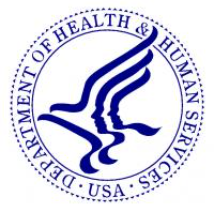 National Advisory Committee on Individuals with Disabilities and Disasters National Advisory Committee on Individuals with Disabilities and Disasters
The Office of the Assistant Secretary for Preparedness and Response (ASPR), in the Department of Health and Human Services (HHS) has announced it is establishing a new committee to provide recommendations to the Secretary of HHS about the medical, public health, and accessibility needs of individuals with disabilities related to emergencies.
Applications are now being accepted for membership on the advisory committee. Up to seven voting members with expertise on disability accessibility, disaster planning, preparedness, response, or recovery will be selected. Application submissions will be accepted until June 12, 2021.
Plain language:
- Part of the government is looking for people to help them know how to improve the way we help people with disabilities during a disaster.
What it means to you:
- Your expertise on accessibility, disaster planning, preparedness, response, and recovery is needed. Consider applying by June 12th.
Action steps:
- Learn more by reading the detailed announcement published in the Federal Register.
- Visit www.phe.gov/nacidd for all application submission information and instructions. Applications are due June 12, 2021.
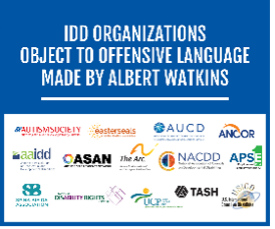 Organizations Object to Offensive Remarks Organizations Object to Offensive Remarks
Leaders of intellectual and developmental disabilities organizations, including AUCD, share their objections to recent statements made by attorney Albert Watkins regarding our communities as reprehensible, inexcusable, and deeply offensive.
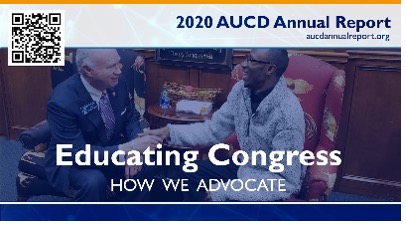 Annual Report Annual Report
The AUCD network provided real-time information from every state and territory including personal advocacy stories that have led the way in educating members of Congress about the needs of people with disabilities in a #COVID19 world.
Action steps:
 Access to COVID-19 Vaccines for People with Disabilities Access to COVID-19 Vaccines for People with Disabilities
Work at the federal, state, and local levels continues to reach the goal of everyone 12 years-old and over having access to vaccine and 70% of people being vaccinated by July 4th.
Plain language:
- Work is happening to make sure people with disabilities can get COVID-19 vaccines. If you have been vaccinated, there are now less restrictions.
What it means to you:
- Work is happening to make sure everyone can get their COVID-19 vaccine and feels safe doing so.
Action steps:
- AUCD COVID-19 Vaccine Confidence Initative: 23 AUCD network centers are engaged in a national effort t ovaccinate all eligible individuals with disabilities by the anniversary of the Americans with Disabilities Act at the end of July. Learn more about the AUCD network centers involved and find resources on the National Center for Disability in Public Health site.
- Webinars:
- Tools:
- There are now three easy options from the U.S. Department of Health and Human Services to find a COVID-19 vaccine:
- Visit vaccines.gov (English) or vacunas.gov (Spanish) to search and find a vaccine near you.
- Text GETVAX (438829) for English or VACUNA (822862) for Spanish to receive three vaccine sites on your phone within seconds.
- Call the National COVID-19 Vaccination Assistance Hotline at 1-800-232-0233 for those who prefer to get information via phone call. The call center can assist in 150+ langauges and features a TTY line (1-888-720-7489).
 Policy Talk Policy Talk
Have a personal or professional connection to disability policy? Submit a post to AUCD Policy Talk! Check out submission guidelines.
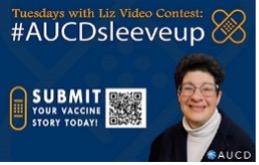 #AUCDsleeveup Tuesdays with Liz Contest! #AUCDsleeveup Tuesdays with Liz Contest!
We are excited to announce the new #AUCDsleeveup Tuesdays with Liz Contest! We are looking for short videos from persons with disabilities, their family members, and other friends of the disability community sharing why you got the COVID-19 vaccine! Videos will be posted to AUCD social media and available for you and others to share with your own social media. The top three videos with the most likes, comments, and shares on social media will *win* AUCD gear and the person with the top video will also win an interview on a Tuesdays with Liz episode!
Submit your #AUCDsleeveup vaccine story today!
#AUCDsleeveup TWL Contest Rules:
- Videos must be less than one minute long.
- Videos should show the face(s) of the person(s) speaking.
- Say your name, how you are a part of the disability community (person with a disability family members, support professional, friend), and why you got the COVID-19 vaccine. For example, "Hi, my name is Liz and I am a person with a disability. I got my COVID-19 vaccine because I want everyone to be healthy and to see our families and friends again."
- We ask that you communicate as clearly as possible so that we can add captions.
|
